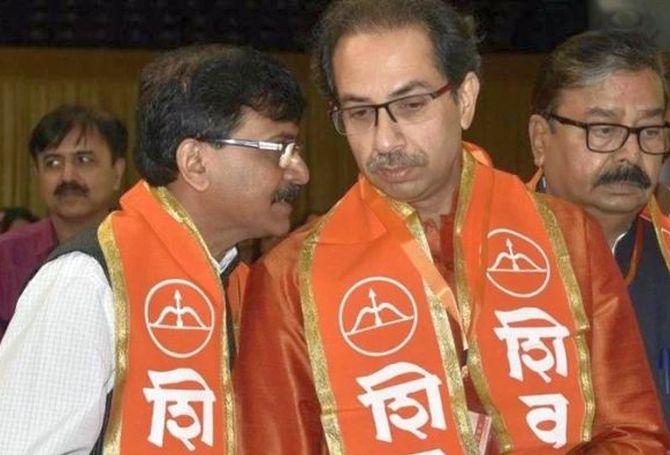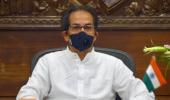The temporary Maharashtra crisis might be over in a few weeks. But the permanent crisis -- the Sena's relationship with its friends old and new -- remains, says Aditi Phadnis.

On the face of it, the political crisis in Maharashtra would seem to be over with the Election Commission (EC) announcing polls to the Legislative Council on May 21.
In the middle of the COVID-19 crisis -- because of which, incidentally, the Rajya Sabha polls were postponed by the EC -- Maharashtra will vote to save Uddhav Thackeray's reign.
Here's the background: Thackeray, who is not a member of either House of the Maharashtra legislature, took oath as chief minister on November 28, 2019.
Under the Constitution, he needs to become member of the legislature by May 28, 2020.
As all elections were postponed due to the COVID-19 pandemic, the state cabinet on April 9 recommended that he be nominated to the Council from the Governor’s quota.
Under Article 171 of the Constitution, the Governor can nominate members having special knowledge or practical experience in literature, science, art, cooperative movement, and social service.
There were two vacancies for members from the Governor's quota after Nationalist Congress Party legislators joined the Bharatiya Janata Party before the assembly polls.
The NCP, now part of the ruling coalition, had recommended two names for the vacancies earlier this year, but the Governor rejected them saying the term of these two seats will end in June -- June 6, to be exact -- and there was no need for an immediate appointment.
If Thackeray had been nominated, he would have had to seek re-election after June 6.
And then there is the question of the propriety of becoming CM from the Governor's quota.
This is not illegal -- at the Centre, Saiyid Nurul Hasan in the 1970s became education minister though he was among the 12 MPs nominated to the Rajya Sabha by the President.
Constitutional experts cite a 1961 Supreme Court ruling on the appointment of Chandrabhan Gupta as Uttar Pradesh chief minister and his nomination to the Legislative Council by the Governor.
The SC upheld his appointment on the grounds that Gupta had taken an active part in politics for several years, which amounted to having experience of social service, thus qualifying him to be nominated to the Legislative Council.
But many questions of legality and propriety arose here.
First, can the Governor, any Governor, ignore a recommendation made by the cabinet? An activist of the BJP petitioned the high court that it strike down the cabinet resolution. The high court refused to entertain the plea.
The politics of this was clear to everyone. The BJP wanted to see Thackeray crawl.
In fact, former CM Devendra Fadnavis gave the game away with his tweet welcoming the decision to hold elections.
'This will prevent Maharashtra from going into instability in the testing times of #CoronaOutbreak & will also uphold the values of our Constitution. It will also uphold the convention that a (MLC) member nominated by Hon Governor shouldn't join the Cabinet (i.e become a CM/minister) (sic),' the tweet said, leaving no one in any doubt about the BJP's stance.
But the Governor's reluctance to accept the cabinet's recommendation gave rise to anxiety in the government: What was Plan B?
In the Shiv Sena, sotto voce, the possibility of making Aditya Thackeray CM was discussed, but his acceptability to other leaders in the party was a big question.
The possible claim by Eknath Shinde, one of the party's tallest leaders, was also discussed.
The Congress is relegated to a bit player in the government. The party most interested in the outcome was the NCP, with a deputy chief minister (Ajit Pawar) already in place.
Remember, ambitions were stirred (with the same Governor stirring the brew) when Pawar hooked up with the BJP and assured them he could form the government and the Governor entertained the plea.
This is where the story becomes even more odd.
It took a conversation between Thackeray and Prime Minister Narendra Modi to ensure speculation was nipped in the bud.
Immediately after this conversation, the Governor called the EC and requested them to hold elections, although the whole country knows Maharashtra is worst hit by COVID-19 and really should not be holding public gatherings, including elections, even one in which only MLAs are required to vote.
This also brings to the fore the relationship between two important arms of the establishment: the Governor and the prime minister (the name of the President, who is nominally the authority to which governors report, is absent from the conversation); and the Governor and the EC, both of which are supposedly autonomous constitutional institutions.
And then, what, if any, was the deal between the Shiv Sena and the BJP? Was it optics (which suited the BJP)?
The temporary Maharashtra crisis might be over in a few weeks. But the permanent crisis -- the Sena's relationship with its friends old and new -- remains.












 © 2025
© 2025